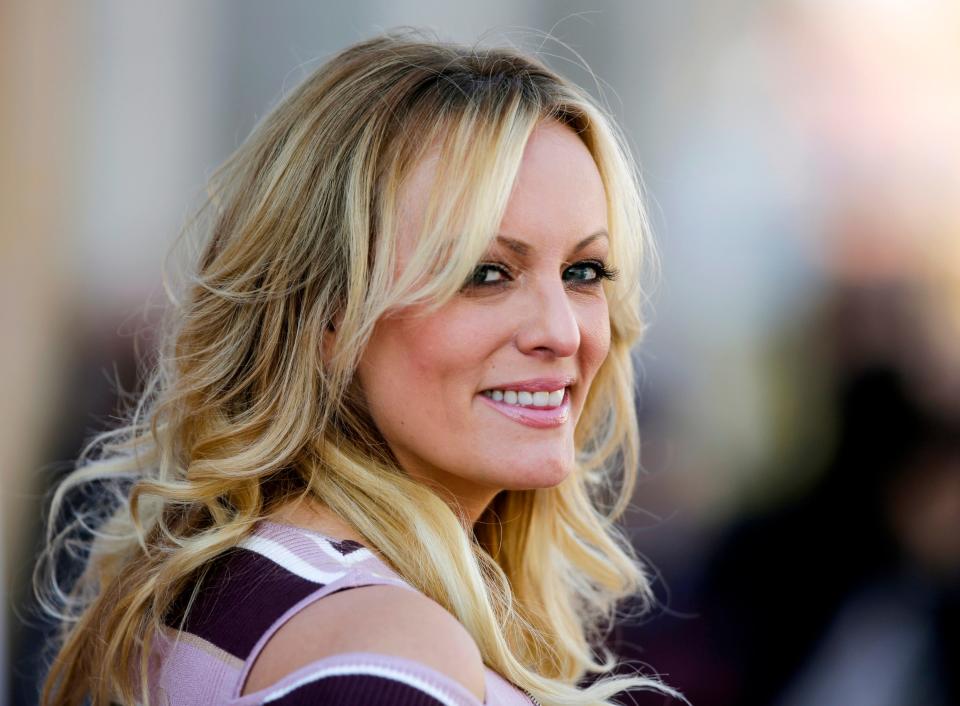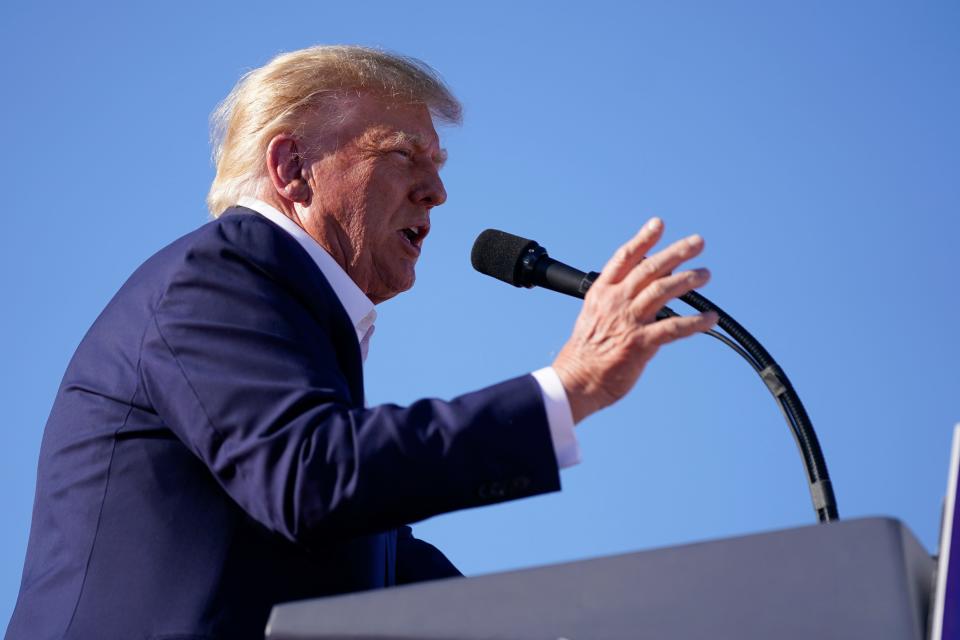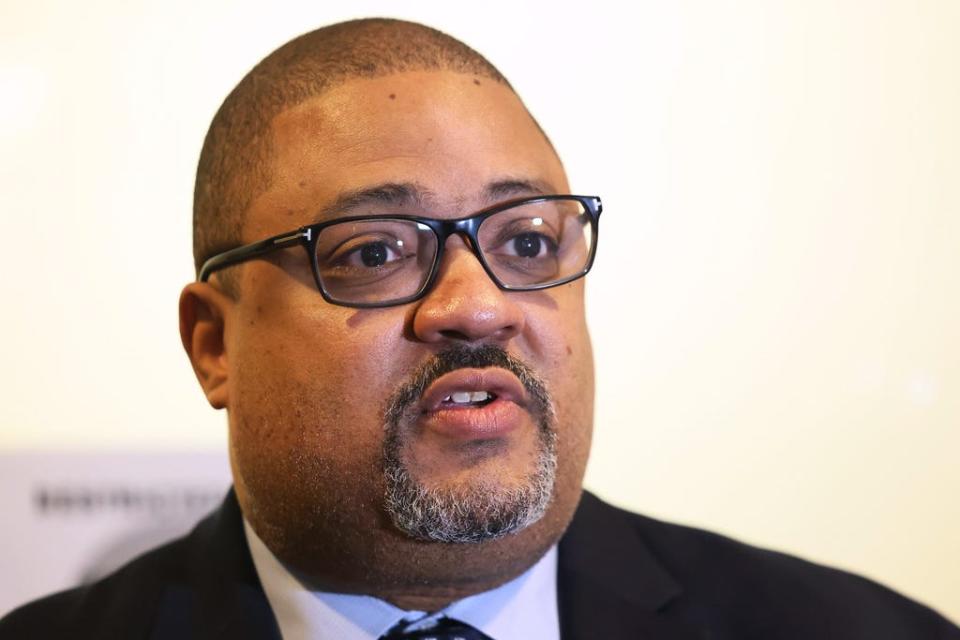Former Trump Organization exec Allen Weisselberg cuts ties with attorneys
Former Trump financial chief Allen Weisselberg cut ties with defense lawyers at the urging of the former president’s firm in the face of mounting concerns the attorneys were willing to entertain overtures from Manhattan prosecutors seeking the executive’s cooperation in their investigation of Donald Trump, two people familiar with the matter said Thursday.
The move comes as a Manhattan grand jury voted to indict the former president in a long-running investigation into a $130,000 payment to adult film star Stormy Daniels during the final weeks of the 2016 presidential campaign to silence her about an alleged affair years earlier.
Trump's lawyers confirmed late Thursday Trump had been charged in a sealed indictment and vowed to challenge the first prosecution of former president in U.S. history.
Weisselberg is viewed as a pivotal witness in that inquiry in which former Trump attorney Michael Cohen has asserted that Trump directed Cohen and Weisselberg to arrange the payment.
Trump Org. trial judge to preside over Trump arraignment: Juan Merchan, judge in Trump Organization trial, expected to preside at Trump arraignment
Alvin Bragg v. Donald Trump: Inside Manhattan DA's latest legal tangle with former president

The former Trump executive remains jailed after pleading guilty for his role in a tax scheme as part of a deal with Manhattan prosecutors in which Weisselberg's testimony helped secure the December fraud convictions against the Trump Organization and the Trump Payroll Corporation.
Weisselberg's plea deal was arranged by his now- former legal team, led by white-collar defense attorney Nicholas Gravante, resulting in a five-month jail sentence, saving him from a possible 15-year prison term.
Allen Weisselberg: Former top Trump financial lieutenant Allen Weisselberg sentenced to 5 months in jail
The plea bargain, according to one source familiar with the matter, first ignited a rift between the Gravante legal team – which was paid by the Trump Organization – and Trump firm officials who objected to a defense decision to allow prosecutors to prepare Weisselberg for his testimony before he appeared in court.
Gravante's team was replaced about three weeks ago after the attorneys and Weisselberg discussed recent overtures from Manhattan prosecutors who were weighing the possibility of bringing another criminal case against Weisselberg while also expressing interest in obtaining his cooperation in the hush money inquiry, the source said.
Trump investigation key players: Alvin Bragg, Stormy Daniels, Michael Cohen: Meet the key players in Manhattan DA's Trump case
The ouster of Weisselberg's legal team and the Trump Organization's role in it was first disclosed by The Daily Beast, which also reported that attorney Seth Rosenberg is now representing Weisselberg.
Rosenberg declined comment Thursday.
Trump Organization attorney Susan Necheles said claims that Weisselberg was "pressured...to switch attorneys are inaccurate."
"Nick Gravante and Mary Mulligan did an excellent job representing Allen Weisselberg," Necheles said.
Trump investigation: Is Donald Trump likely to be arrested soon? Will he be indicted? What we know
"It appears that someone is trying to feed the public a false narrative because they are unhappy that Weisselberg switched lawyers. I have no idea why Weisselberg left Nick Gravante but his decision to do so was entirely his own, a decision which I understand Mr. Weisselberg made in consultation with his family.”
The Manhattan District Attorney's Office declined comment.

Anticipation of a charging decision intensified earlier this month when Trump falsely declared that New York authorities were planning to arrest him March 21.
Since then, at least one additional witness has testified before the grand jury empaneled in the investigation, while Trump has railed against District Attorney Alvin Bragg and urged his supporters to stage protests against any law enforcement action.

The call for demonstrations echoed the former president's appeal to descend on the Capitol two years ago and prompted law enforcement officials to bolster security at key locations in New York and Washington, D.C., to guard against any potential violence.
It was unclear whether any push for Weisselberg's cooperation was factored in the timing of a decision to charge the former president.
In interviews with USA TODAY, and in his 2020 book, “Disloyal: A Memoir: The True Story of the Former Personal Attorney to President Donald J. Trump,” Cohen said Weisselberg was a key participant in the hush money payoffs, and the only eyewitness to some of the discussions with Trump about how to silence his accuser.
Cohen described how an angry Trump wanted to make sure Daniels was paid off so his wife Melania wouldn’t find out, and so it wouldn’t torpedo his chances of winning the 2016 election, which was just days away.
Other countries have charged leaders: Charges against Trump would be a first in US. But other countries? They routinely charge leaders.
"It's only $130,000," he sighed finally. "Go talk to Allen and figure it all out,'" Trump told Cohen, according to the book.
Cohen went to Weisselberg's office just down the hall, “and within a minute we were discussing how to pay Daniels the money in the most discreet and untraceable way possible. It was obvious that he'd been briefed on the matter, so there was no need to explain that background,” Cohen wrote.
“’Did the Boss approve payment?’ Weisselberg asked,” according to Cohen. “Yes, I just left his office," he replied.
Karen Friedman Agnifilo, a former chief deputy prosecutor in the Manhattan District Attorney’s Office, said there are guardrails in place to try and protect people like Weisselberg from undue influence from lawyers or third parties who may try to influence what they say to investigators or a grand jury in a criminal case.
Agnifilo told USA TODAY that the law and legal policy isn’t clear about whether the Trump Organization could seek to influence lawyers they hired to represent Weisselberg to also be protecting the company’s own interests – especially if that comes at the expense of their client.
“Is it ethical of them? I don't know the answer to that" because corporations are bound by less stringent guidelines than lawyers, said Agnifilo, who served as the chief assistant district attorney until late 2021, just before current District Attorney Bragg took office in January 2022. But, she added, "I'm sure that that could happen."
“But I don't know that that would make a difference. They could want that,” she said of the Trump Organization. “But that doesn't mean it would happen. That's just not how lawyers work.”
Agnifilo said most legal retainer agreements contain language saying that even if someone else pays for a client’s legal fees, that the lawyers are there to represent that client and that client only.
“It’ll say that whoever is paying have nothing to do with this case and everything I do is in your interest only,” she said. “So it sounds like the lawyers were doing exactly what they should have been doing. And I think the new lawyers will do the same thing.”
“Unless you're a corrupt or unethical lawyer, you're not going to” represent the interests of the Trump Organization at the expense of the person they are paying you to represent," she said.
This article originally appeared on USA TODAY: Ex-Trump Organization exec Allen Weisselberg cuts ties with attorneys


